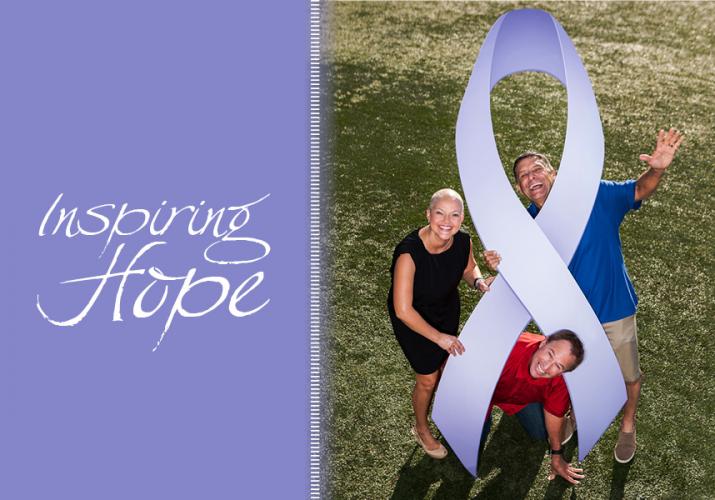
Photos by Phillips Mitchell unless otherwise specified
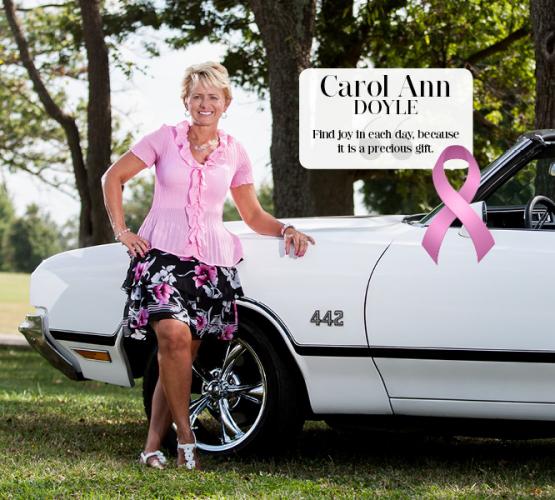
Carol Ann Doyle is a great example of not ignoring your instincts about your health. Thirteen years ago, a hard spot in her left breast was discovered and dismissed as “normal.” She decided to have further testing and an ultrasound and biopsy confirmed her fear, she had breast cancer.
Carol Ann’s greatest support was her husband of 34 years, John, her family, close friends, colleagues and church family. “God has blessed me with many treasures.” Finding comfort in family, she also reached out to a Bible study group. “As the women gathered around me in a prayer circle that night, I knew that I would turn it over to God and He would get me through it.” The hardest part of the experience was relying on others to take care of her. “My family did the household chores and my dear mother-in-law and aunt took over the laundry and house cleaning during all of my surgeries and treatments.”
She is grateful to have had such a caring group of people loving and encouraging her. “I especially am grateful for my cousin, Jane Lee, for her love and support as she drove me to all of my treatments. The time that we spent together during this difficult journey meant more to me than anything.”
Keeping a positive attitude fueled her determination to be a survivor. “My best resources were my wonderful caring doctors, Oncologist, Dr. John Gohman, Surgeon, Dr. Sid Hopkins, and Plastic Surgeon, Dr. Woodrow Moore.”
Carol Ann wants to share her story. “I want to encourage you to count on the support of your friends. Don’t try to go through it alone.” Her experience has brought her closer to friends and family. “It has also brought me into a closer relationship with God. I believe it’s my purpose in life to share my journey, witness and encourage others.”
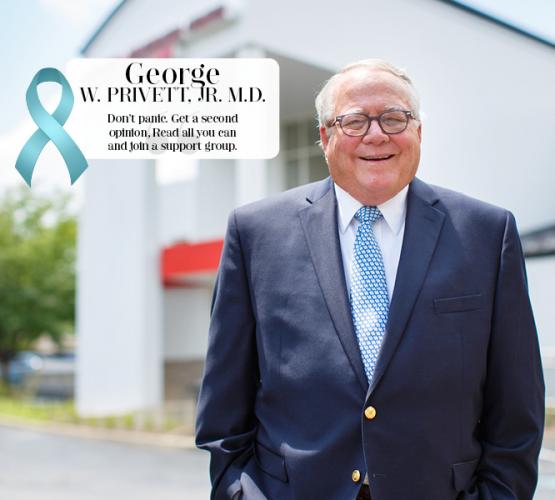
Like many men, Dr. George Privett was diagnosed with prostate “cancer” in his early sixties after lab results showed an elevated PSA count. For him, the most difficult thing to face was not the diagnosis, but choosing between the various and often conflicting ideas about how or even whether to treat the disease. He explains that he uses the term “cancer” in quotations because there are two kinds of prostate diseases. Both are called cancer, but one does not act like cancer, and the other one can kill you quickly if untreated.
Dr. Privett has become an outspoken advocate of active surveillance since his prostate cancer diagnosis nearly ten years ago. As the owner of a medical imaging facility, Dr. Privett learned all he could about multi-parametric MRI, an exam that enables physicians to see precisely where tumors are present in the prostate. For Dr. Privett, watchful waiting was an appropriate option for nine years before opting for successful radiation treatment 6 months ago.
“I found strength in what I thought was a rational approach to treating patients, as well as myself,” he says. “If anyone is diagnosed with prostate cancer, I would remind them that 90% of prostate cancers are benign tumors, so this is often not an emergent situation.”
Dr. Privett is always open to talking about his journey with prostate cancer and welcomes anyone reading this to contact him for further discussion.
Photo by Conrhod Zonio
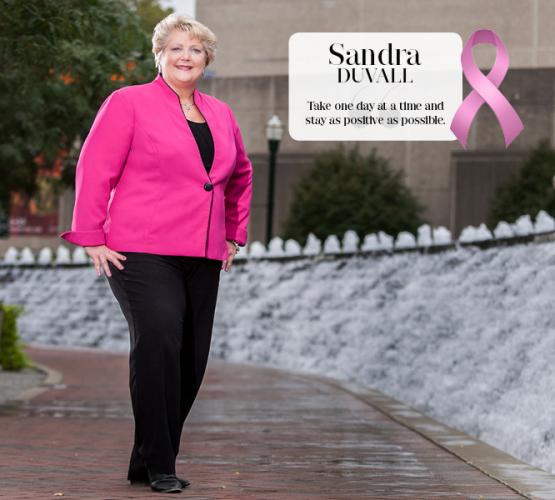
At age 49, Sandra Duvall had her annual mammogram. She was in disbelief when the test revealed that she had developed breast cancer, particularly since she did not have any symptoms.
A lot of changes were occurring in her work place, making her nervous about revealing her diagnosis to more than a small group of family and friends. “The ownership of the property I worked for changed the same month I was diagnosed and there was uncertainty if I would be hired by the new ownership.” With four rounds of chemotherapy required, she initially did not tell anyone and kept working, only disclosing her diagnosis after the 3rd treatment. “The new owners were wonderful when they became aware of my diagnosis. I did manage to continue to work, attend activities with my kids and live a fairly normal life.” It was, however, very difficult to maintain due to exhaustion, especially during chemotherapy weeks.
Sandra’s greatest supporters were her husband of 16 years, Bruce, her children, Christina and Justin (now 15 and 14), family and friends. “My husband worked all day and would cook, take care of the kids and anything else that needed to be done at home so I could recuperate and be able to work the next day.” She also had support with bringing meals and carpooling her kids, then ages 10 and 11.
Her faith as a Christian gave her strength. She also had great resources in her medical team, Dr. Kimberly Stigers,
Dr. Jessica Moss and Social Worker, Stacy Florence. “Stacy still makes a point to check on me when I am in for bi-annual appointments.”
Advice that Sandra gives to others is, “Take one day at a time. Lean on your faith, family and friends and stay as active and positive as possible, it will make the hard journey easier.”
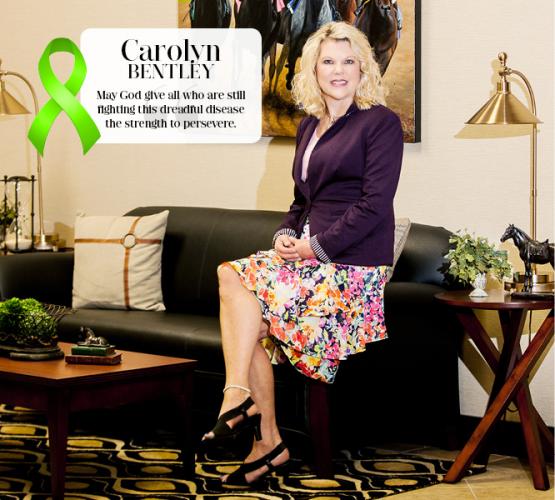
Carolyn Bentley has an inspirational quote that she still reads and it comes from James 1:2-4, “Consider it pure joy, my brothers, whenever you face trials of many kinds, because you know that the testing of your faith develops perseverance, and perseverance must finish its work so that you may be mature and complete, not lacking in anything.”
In 2012, a routine mammogram showed a “dark spot.” Carolyn automatically assumed that it would be breast cancer, however she was diagnosed with Large B-Cell Non-Hodgkin Lymphoma. She did not receive the final results of her prognosis for 19 days following. “I did not know how bad the disease was or was not. Was I going to live or die? I had come to terms with whatever my prognosis might be. Was I scared? You bet.”
Her husband, Claude, the strong patriarch of the family, was a great supporter as well as the rest of her family, church family, coworkers and friends. Even her mother, still living at 87 years old and who battled the same type of cancer in the mid-90s, rallied behind her as well.
Carolyn soon learned that her prognosis was good and that gave her the will to fight. “I knew no matter how it turned out that God had this. I was never in any doubt about that.” She also continued working part-time during her treatment which provided some much needed normalcy. “My only resource was my faith in Jesus Christ and everything that He stands for. No other person and no other words were more comforting than the Bible.”
She encourages others to “surround yourself with positive people and focus on something good every day.” Now four years cancer-free, she states, “It has made me grateful for everything. All the little things I took for granted took on a new meaning.”
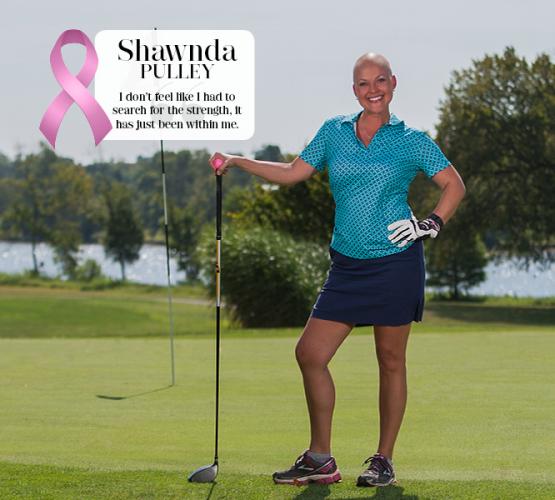
At the age of 40, Shawnda Pulley found a lump while doing a self-breast exam during the month of October. Initially the lump was thought to be a cyst, but it ended up being Stage 3 cancer. “I was numb, terrified and anxiety took over at first. My anxiety and fears came mostly because of the unknown.” After learning more about her diagnosis and prognosis, she knew that she was ready for the fight. “I was determined that it was not going to control my life, not for one more day.”
A mother of 3, with a significant other who is her “oak tree,” Shawnda had a great support system around her. While it was a struggle telling her parents and children about her diagnosis, she was determined to not have it define her or consume her everyday life. She leaned on her family and close friends for support and her work family for support. Support was also found in strangers. “In some cases support came from individuals I did not even know but now I am blessed to call great friends!”
Cancer has been a life-changing experience. “Being diagnosed at 40 was a tough pill to swallow, but I also feel like there has been a lot for me to take away from the experience, and I’m still learning on a daily basis.”
Shawnda has advice for those going through cancer, or any other struggle in life, “Go bald. Leave the scarf at home. Be proud. Anything it takes to make people aware and to want to become more informed.” Awareness is extremely important to Shawnda, particularly since she found her lump through self-exam. “Don’t be afraid to share your story with others. Sometimes others will have stories to share with you!”
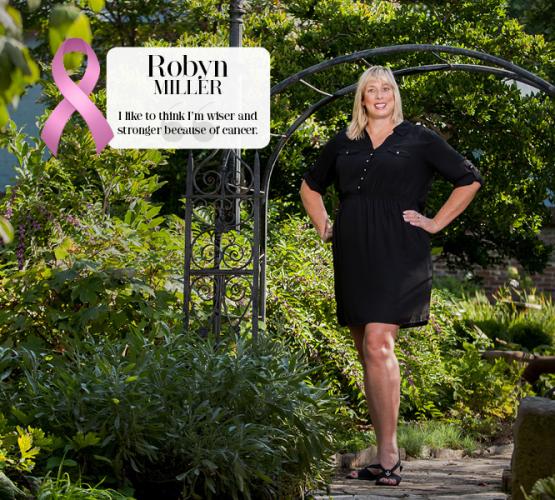
Robyn Miller’s initial reaction to her diagnosis of Stage 2 breast cancer, at age 36, was disbelief. “I had no family history, no warning signs and no clue my baseline mammogram would be anything but normal.” Now cancer-free since 2003, she recalls her experience and hardest part was the treatment. “Chemo was scary,” Robyn recalls, “and the side effects were unpleasant. I had to keep reminding myself that I felt so bad because it was working. Losing my hair and looking like a cancer patient is sobering and hard.”
Robyn found the strength to fight. “My parents raised me to be strong and independent. Not fighting was never an option. Zoloft and Xanax helped too.” Love and support came from family and friends and was “overwhelming and greatly appreciated.” Her employer allowed her to work from home during treatment. She maintained involvement in the Jr. League for a sense of normalcy.
“Knowledge is power. I did my best to arm myself with information, and when I became too overwhelmed, I enlisted the help of my family and friends to help me gather information and tools to get me to the next steps in my treatment.” She took each hurdle one at a time, until there were “no more surgeries, no more treatments, no more tests, no more scans, no more follow-up appointments, and eventually, no more 6-month checkups.” She celebrates now being back to annual mammograms.
Robyn encourages others to “stay positive.” Her surgeon, Sidney Hopkins, told her that a positive attitude is 80% of a successful outcome and she believes him. “Cancer is part of who I am. I like to think that I’m wiser and stronger because of it. It helps me to appreciate every day I have on this Earth and reminds me to not sweat the small stuff.”
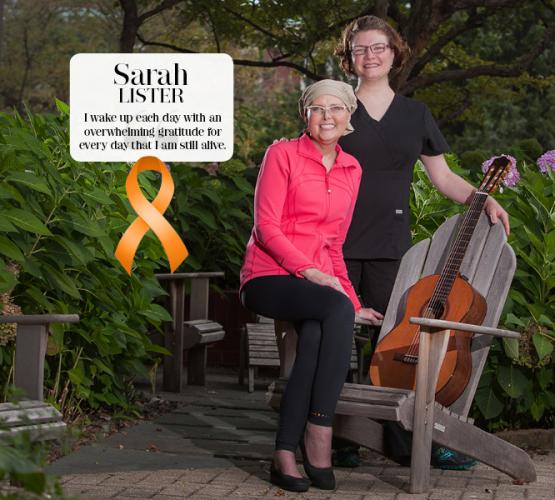
On January 5, 2016, Sarah Lister, Executive Director of Ronald McDonald House Charities of the Bluegrass, received a call that changed her life. The personal call from her doctor that evening revealed that she had Acute Myeloid Leukemia. “He said I would need to go into the hospital the very next day for a month of aggressive chemotherapy.” That alone was difficult to digest, but the hardest part was that her 2 sons, ages 8 and 3, would be unable to see her during that time due to immune system compromise. “Not seeing them for an entire month was unimaginable,” recalls Sarah.
Over the course of the year, Sarah has been hospitalized a total of 122 days. “There was physical pain associated with many of my treatments, but nothing compared to the emotional and psychological pain of missing snuggling with my kids.”
Support rallied around her in the form of #TeamSarah, many friends, co-workers, family and even a few strangers. Even with all the power of #TeamSarah, she acknowledges her greatest support system in her doctors, nurses and techs. “I was in capable hands of a fine Bone Marrow Transplant team led by Dr. Gerard Hildebrandt.”
There were long, dark days, but comfort in friends that just “knew” what she needed, amazing Music Therapy provided by Music Therapist, Jennifer Peyton (pictured with Sarah) and communicating her story with others on the blog site, CaringBridge. “For me, being very open and communicative about my experiences, fears, ups and downs was extremely helpful.”
She encourages others to spread the word about the National Bone Marrow Registry (BeTheMatch.org). “With so many advances in medicine, bone marrow donations are no longer the scary, invasive process of years ago and come with the satisfaction of knowing you are saving lives.”
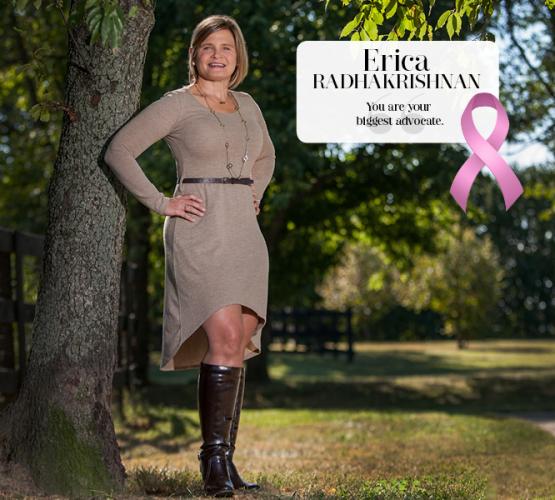
Erica Radhakrishnan experienced the terror of cancer twice in her life. At 34 and 37, she noticed symptoms that led her to her doctor and a cancer diagnosis. “Both times I found the cancer myself. I am a strong advocate for self-breast exams.”
A wife and a mother to four bright and active girls, she states, “Witnessing the emotions and mental pain my family experienced because of my diagnosis will always be the hardest part.” She found great support in her husband. “I could not have asked for a better caregiver. He truly loves me unconditionally and I am so grateful for his patience and compassion.” Her four daughters also gave her strength. “They were a constant source of love and laughter.”
Erica received support from many places, at different times. Her friends and family were “amazing.” Markey Cancer Center’s staff and her doctors, Edward Romond and Jonathan Feddock were “angels on earth.” Erica states, “I cannot adequately express my gratitude to the both of them.”
A cancer diagnosis has so many physical effects. However, Erica acknowledges the mental, as well. “My mental wellbeing took a serious blow. I sought out a private therapist, but also took advantage of speaking with Markey social workers.” She also benefited from a special technique called Jin Shin Jyutsu, provided through a program at Markey. “It’s an ancient technique, similar to acupuncture, but instead of needles, it uses touch to ease pain, nausea and stress.”
Erica wants everyone to be aware of the importance of being an advocate for your own health. “If something feels off, get it checked out and pursue it until you feel you have adequately addressed your concerns.” She also encourages others to be thankful for their caregivers. “Their work takes a toll on their wellbeing, as well. They need to know they are loved, too!”
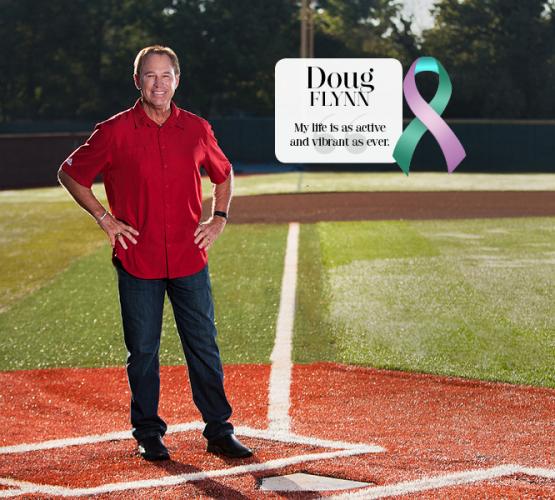
Doug Flynn, Central Bank employee, TV and Radio Host, began having symptoms that were not normal for him, such as shortness of breath, tightness in his chest and lightheadedness. He sought further testing, which revealed a cancerous nodule on his thyroid. At age 60, a cancer diagnosis was a shock. “Cancer was always something that happened to others and surely not me.”
Fortunately, his doctor, Dr. David Sloan, was confident that he could remove the thyroid, Doug could take medication and he could get on with life. “Wondering if my voice would ever return caused some alarm, but overall I have been blessed by having a cancer that is treatable.”
Great support began with his wife of 34 years, Olga, who “instantly became nurse, doctor and caretaker. If I didn’t always show it in the past, I absolutely realize how special my wife is.” He also credits his family, as well as co-workers at Central Bank for being “outstanding as well as understanding.” He worked to stay positive throughout his battle. “Being upbeat is vital for healing so we always tried to be around optimistic, fun people.”
Strength came from his faith. “I have always leaned on my faith in Christ as the source of strength, grace, healing and insight. God has shown me that although I am not always happy with my circumstances, I can still have a joy of knowing Him and that He is really in control anyway.” Prayers on his behalf allowed him to have “peace that far exceeds human understanding.”
Talking to others who had battled similar circumstances helped a great deal. “Surround yourself with realistic, but positive people. Our attitude is so important and it’s something we can control.” Cancer changes your life. “I think it has amped up an existing yearning to enjoy life on a daily basis.”
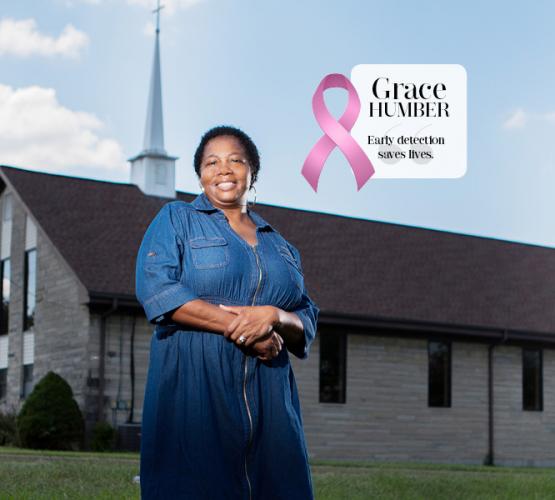
Grace Humber’s breast cancer was detected at age 52, during her yearly screening mammogram. She works as a Housekeeper and remembers the day that the doctor told her that she had breast cancer. “I was at work when I got the call and I just cried, but my coworkers were there for me.”
Her mother had passed away in October 2014, and not having her present to share the diagnosis with was one of the biggest challenges of her experience. “My faith in God gave me the strength to fight.” She found encouragement and resources in those around her. Grace had a great support system in her family. Her husband, Lee; daughters, Teleeika, Latoya and Vanessa; her five grandchildren and six siblings were very supportive. “They are very loving and caring.”
“I continued going to church and seeking God and was encouraged by many who loved and knew me.”
Grace offers encouragement to others by saying, “For those that are battling cancer, just hold on, be strong and God will see you through it.” She knows that cancer has changed her life. “I live each day to the fullest because tomorrow is not promised to us.”
Grace has been in remission since December 2015. An important thing that she would like others to know is, “If you don’t have a Primary Care Physician, get one now, even if you feel you are healthy. Do not wait until it’s too late. Early detection saves lives.”
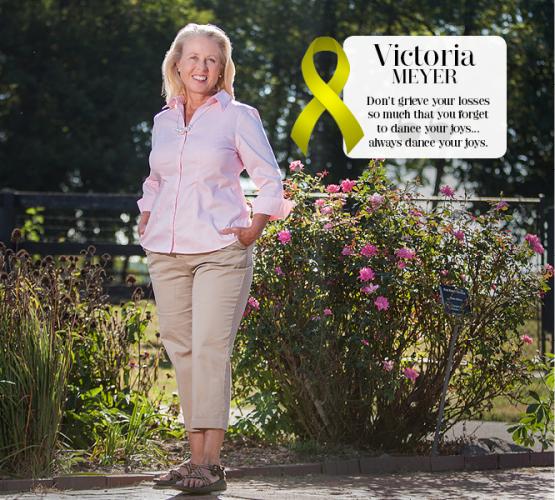
Working as a cancer community outreach nurse for many years, Victoria Meyer knew that one in four Americans will have cancer in their lifetime. She had a visible lump in her sternum and when she was diagnosed with Chondrosarcoma, she simply acknowledged, “It was my turn.” Being a rare form of cancer, she was eager to do research. “I would print out articles, but after reading the first one…when it came to the prognosis section, I sealed them in a manila envelope and never looked at any survival estimates or chances of recurrence.”
She knew that she had to gather information and make decisions on her own. “If I had not taken charge, I might not have had the success I have had.” When a respected surgeon told her, “This is bad, and I’m not sure what to do,” Victoria felt as though she had a seashell up to her ear and all she could hear is the ocean roar. A little voice in her head was telling her, “This is good for an oncology nurse to understand what this is like. No wonder people don’t remember your instructions.”
Victoria had an amazing network of friends and colleagues that rallied around her for support. A dear friend, Pyddney Jones told her, “OK, you’ve had 12 hours to cry and now it’s time to buck up and fight this thing.” Dr. Kimberly Stigers connected Victoria with a surgeon at Emory in Atlanta, Dr. Miller, who gave her the confidence that surgery could be successful.
She encourages others to not rush into treatment. “Take the time to understand what is happening and choose the path that is best for you.”
Survivor’s guilt is difficult. So many have been lost along the way. “I definitely live every day with a sense of gratitude.”
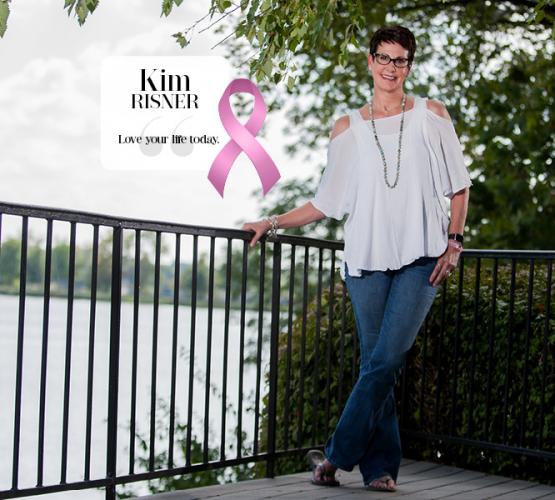
Kim Risner was devastated when, at age 56, her doctor discovered that she had breast cancer. “I am an athlete, eat well and do all the right things to not get cancer! Are you kidding me?” she thought.
She leaned on family, her strong and supportive husband, Steve and her son, Drew, who “always keeps a positive attitude and makes me happy.” Her family, including siblings, has always been close and supportive. She also credits support from her work, running and yoga families. “All were praying and sending me good vibes. How could all the love I felt not help me?”
Her mother passed away 6 years ago from lung cancer, but Kim felt her presence, “She taught me to always be strong, keep up a positive attitude, pray and trust the Lord to do the right thing and have faith.” Being a runner, Kim already had the discipline of setting a physical goal and going on until the end, mentally telling her body, “You can do this! Keep going!”
Kim found that yoga really helped her accept what her body was going through. “Yoga was my physical therapy for regaining my mobility and movement.” Three weeks after her bilateral mastectomy, she began working to achieve the mobility that she had before cancer.
“I took a very aggressive approach to battling my cancer by doing a bilateral mastectomy and no reconstructive surgery. I knew that my breasts did not define me as a woman. My heart and soul are stronger than ever.”
She encourages others to be proactive with treatments. “I always hold my head high with confidence. I live life for now.” Kim also found keeping a journal helpful. “This part of my journey through life is to make me better and shine so others may be inspired by me.”
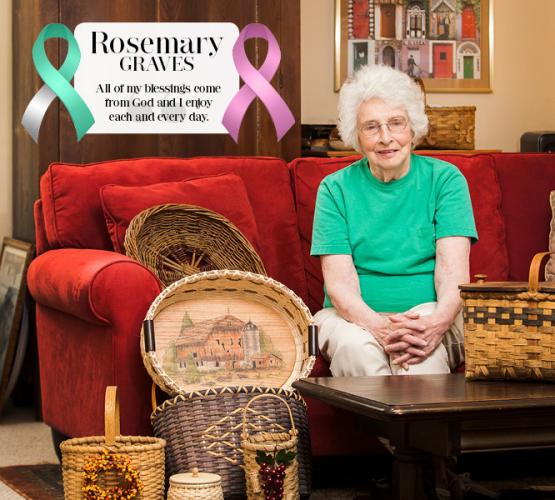
At age 87, Rosemary Graves has survived 2 bouts of breast cancer, as well as cervical cancer. At age 17, she watched her mother fight the disease and learned so much in the process. “My mother was a very strong person. She taught me that you fight, and then you move on.”
When Rosemary was 41 years old, she found a lump in her breast when performing a breast exam. She is a firm believer that women should do these exams on a regular basis. There was a high cancer incidence on both sides of her family, but that didn’t make her diagnosis any easier. “I was scared to death. I just wanted to be here to raise my children.” Her cervical cancer was discovered at a later date, when after recurring infections, her doctor recommended a hysterectomy. Pathology showed cancer cells, which would have gone otherwise unnoticed.
Rosemary has been instrumental in breast cancer support in the community. In 1975, she and others formed the first breast cancer support group in the United States, The Thursday Group. Their motto is, “We come to receive…we stay to give.” Over decades, Rosemary and The Thursday Group have provided support to many women battling a breast cancer diagnosis. “We want to give comfort and bring them hope.”
Rosemary encourages others to, “Reach out and don’t be afraid to talk about it. Find someone to confide in.” Throughout her experience, she proclaims that her faith played a large role. “I live a happy life. My Higher Power, family and friends gave me the support I need.”
Over the last 30 years, Rosemary has enjoyed learning about and teaching basket-weaving. She has traveled in parts of the US and abroad to learn and teach others.
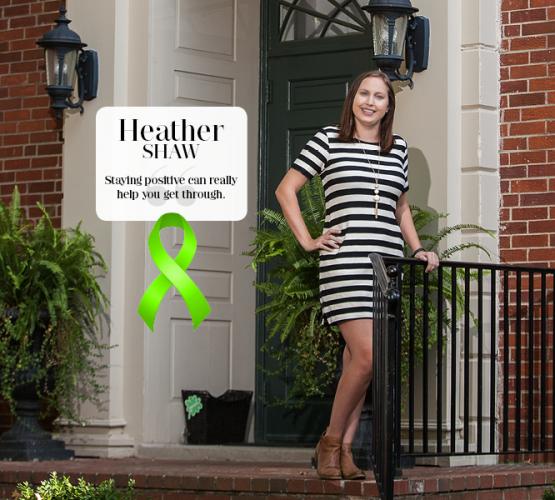
Heather Shaw is a 27-year-old lymphoma survivor originally from Cincinnati, OH, but now living in Lexington, KY.
At the age of 13, Heather was diagnosed with a liver disease and received a liver transplant two days before her 17th birthday.
At one of Heather’s follow-up blood draws, it was found that her kidneys were failing. This led to more tests and Heather was diagnosed with Burkitt’s Lymphoma, a fast growing form of Non-Hodgkin’s Lymphoma, that caused multiple tumors in her abdomen to almost double in size overnight.
She was transferred to the ICU, gained 50+ pounds of fluid within days, had multi-system organ failure, brain bleeds and started chemotherapy. Heather was grateful that Cincinnati Children’s implements palliative care as a standard. Without it, Heather’s brain bleeds would not have been caught by her doctors until much later. Heather’s journey included many doctors with multiple specialties working together for one common goal, getting rid of the cancer.
Heather has traveled a long road since her cancer diagnosis. She had to learn to walk again and how to do normal everyday tasks. She credits her amazing family, her sorority, Kappa Delta, and UK basketball for helping her get through. Being 2 hours away from UK was tough, but her sorority sisters continually kept her motivated by coming up to Cincinnati. They dyed her hair pink before it fell out, dedicated their DanceBlue team to her and spent many nights at the hospital helping to keep her spirits up. Luckily it was also UK basketball season and Heather had several doctors and nurses that loved the team just as much as she did. The day after her 20th birthday, Heather learned she was cancer free. Now, at 27 years-old, Heather is married and has a beautiful two-year-old daughter.
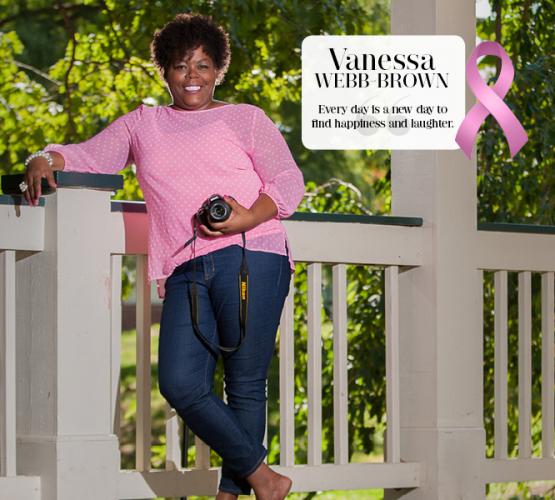
Just ask Vanessa Webb-Brown about the importance of breast self-examination. She found a lump in her breast a few days after her 42nd birthday. At first, she thought it may be due to drinking caffeine, but further testing revealed 5 lumps, all cancerous. Her diagnosis, Invasive Ductal Carcinoma with HER2-positive.
Vanessa’s family rallied around her. “We are a family that plays together, prays together and loves being around one another.” Even her baby brother, Ace, whom she was most concerned with upsetting with her diagnosis, stepped up to be her “big” brother and gave her strength by providing support and tender, loving care.
She also found strength in her husband of 20 years, Charles. “He was my rock through it all. My husband, best friend, doctor, psychologist and anything else I need him to be.” A pillar of strength, he never doubted her full recovery, telling Vanessa, “God won’t put more on me than what I can bear, so I know you will be alright.”
Vanessa also had amazing support from other family members. Her nieces and nephews who she states, “are my children” filled her with so much love and happiness. Her sister stood beside her as a spiritual partner, her parents were everything she needed them to be and her aunt Anna would catch public transportation to be by her side. “They made the healing process easy and humorous.”
Faith was rediscovered during her cancer journey. “I was a sheep that had wandered away from the flock for over 5 years and the Shepherd came to see about me. During my darkest hour I held on to my faith and was bathed in His light and there is nothing greater than that.”
Now 3 years cancer-free, Vanessa encourages others, stating, “Stay strong. Courage comes when you need it the most.”
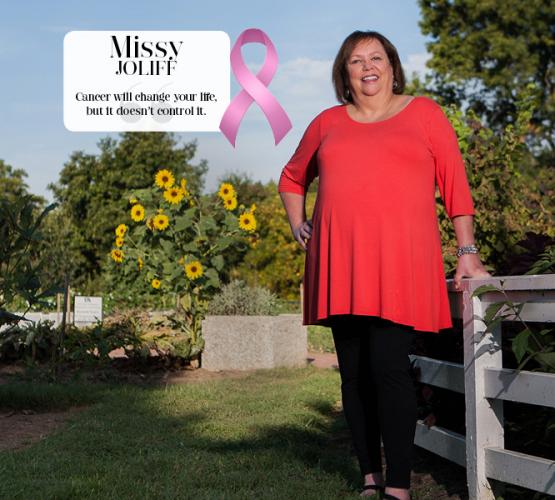
For three years now, Missy Jolliff has been successfully living with metastatic breast cancer. She was cancer-free for 11 and a half years and then was re-diagnosed after a recurrence. “I found a lump in the shower and I didn’t waste any time getting to the doctor. I’d also had an injury, so biopsy indicated scar tissue.” With prompting from her sister, she had the lump removed and it was Stage 2 breast cancer.
While her first reaction was fear, she soon channeled her energy into educating herself as much as possible. “I read everything I could get my hands on.” Missy has a great support system in her husband, and best friend, Jeff. “He has supported me and listened to my fears since the beginning. I could not have done this without him.” Her 97 year “young” mother and 5 “fabulous” siblings rallied around her, especially sisters, Debbie and Jenny, and many friends.
“I increased my exercise and started eating better and prayed, which helped me keep the faith and a positive attitude.” She also got more involved with volunteer work. She currently serves as Board Secretary for Kentucky CancerLink. “Giving back was a way to understand my place in the world and know that, with or without cancer, I have something to offer and can still participate in life!”
She encourages others to pray, listen to doctors, keep the faith, eat better and never give up hope or stop living. “I recognize how short life can be. I try hard not to miss opportunities to live life to the fullest and thank God for every second of life. Thanks to the professionals dedicated to eradicating cancer, more and more people are successfully living with the disease.”
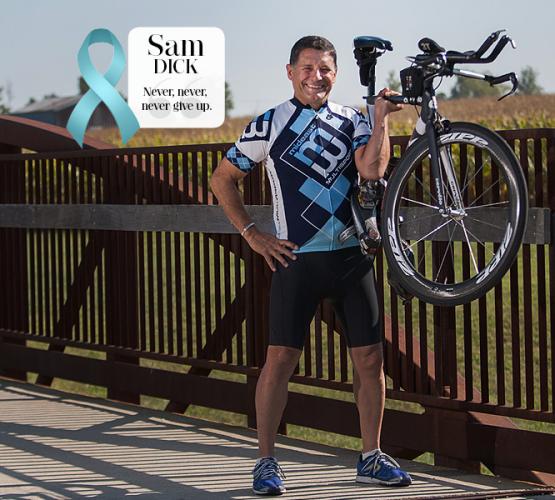
Sam Dick, a local News Anchor/Reporter for WKYT, welcomes the opportunity to talk with and help other men newly diagnosed with prostate cancer. “I am not an expert, but I certainly can relate my experiences to give them perspective.”
Sam’s own experience began 6 years ago, at age 54, during a routine check with his Urologist. His PSA test had doubled, a red flag indicating a potential problem. Biopsy of his prostate showed cancer. With no symptoms, the unexpected diagnosis left him with feelings of shock, surprise, anger, disappointment and fear.
With the support of his wife of 21 years, Noelle, who has “been my rock,” Sam visited two nationally recognized cancer centers, researched available treatments and talked to prostate cancer survivors. He credits his wife, children, step-mother, Lalie, his sisters, and mother-in-law, Connie, as his biggest supporters. He also does not forget the support from his co-workers at WKYT and all the many viewers that reached out to him. “Prayer, good information, love of family and will to beat this,” gave him strength he needed to fight.
Sam encourages the support of family and friends, seeking more than one professional opinion, prayer, a positive attitude, picking the doctor and hospital/treatment center that works best for you and as his father said, “Never, never, never give up.”
He feels lucky, since prostate cancer is treatable and curable, and encourages men to see a Urologist and have a PSA test every 6 months, especially if there is a family history. The PSA can help detect issues early.
“I try not to sweat the small stuff. Most of the problems or challenges I encounter in life can’t compare to fighting cancer.” An avid athlete, Sam swims, bikes and runs every week! “Cancer is not the end of physical activity! Every day is a blessing!”
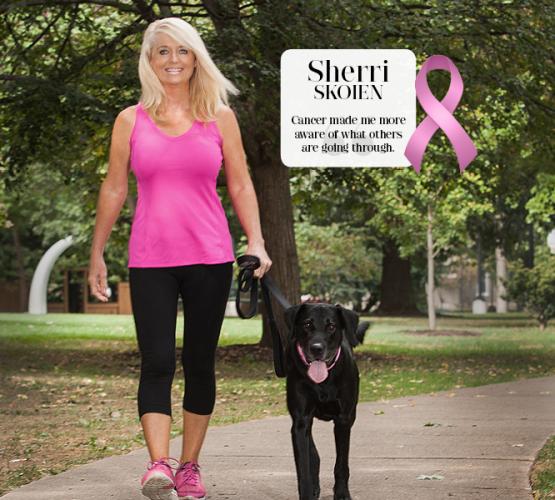
Sherri Skoien was diagnosed at age 52 with breast cancer, DCIS in Situ, during a routine mammogram. “I went into warrior mode, then the fear and questions set in.” A big challenge for her was to make the right decision for her and her family. “Seeing the fear in my family’s eyes was the hardest part of this experience,” Sherri recalls.
By her side was her rock, her husband who is the “heart and soul of who I am.” She also gained strength from her children, grandchildren, her loving parents, brother, mother and father-in-law, dog and cherished friends, including Carla Burke in Texas and Bobbie Niehaus in Lexington, as well as her dear friend, Denise Austin Rains, who sadly passed away. Sherri remembers, “My friends, family and faith that it would all be okay gave me the strength to fight.”
She worked to become educated about her diagnosis prior to making her final decision on treatment options. Sherri encourages others by saying, “Please do your research before you make a decision and be informed of all of your options.”
Now 1-year cancer free, Sherri believes that cancer made her more aware of what others are going through and need to reach out and help someone who may not have the resources to get the help they need. She advises others to realize stress plays a huge role in how the body reacts. “Try not to take on too much, take time for yourself and say no sometimes.”
Sherri is very excited about a joint project she is working on with her friend, Carla. It will outline their stories, include devotions, diet, exercise, random acts of kindness and many other things that they feel will be helpful for newly diagnosed women.
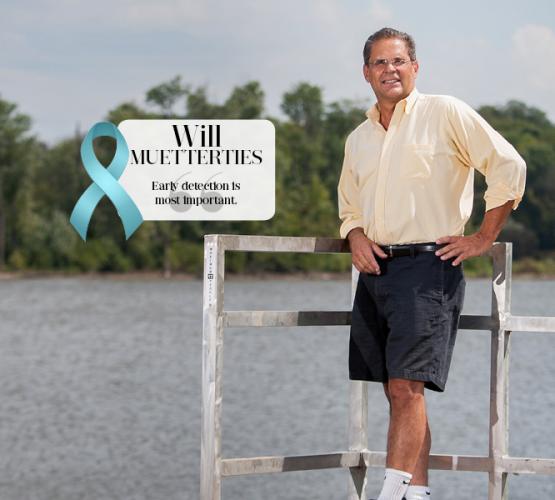
Receiving the news that he had prostate cancer came as a surprise to Will Muetterties. “I had never been in the hospital, never experienced anything other than sports injuries and have been healthy all my life.” The wake-up call came at age 60 after his PSA, a blood test he’d been receiving every 6 months, had been steadily rising and eventually spiked, indicating an issue. Biopsy of his prostate revealed an aggressive form of cancer that required surgery.
Will found support through his family and friends. His wife of 36 years, children, friends and business partners all stepped up to help him during his time of need. He considers himself fortunate to have been able to go through surgery and avoid having radiation or chemotherapy. “I’ve had to focus on being patient through my recovery from the surgery and some of the side effects of having your prostate removed.”
During this time, he found the internet helpful as a great source of information enabling him to compile a list of important questions to ask. “I found a doctor that I really liked, Dr. Thomas Slabaugh, Jr., who was experienced and patient. That meant a lot along the way.”
Will realizes that cancer changed his life. “I’ve had to slow down a little work-wise and that was an adjustment. Also, it’s forced me to reevaluate taking more time off to enjoy my loved ones.”
The most important thing that Will encourages others to do is to understand the importance of early detection. Tests like the PSA can detect problems a lot earlier than waiting for symptoms. “My prostate cancer was stopped from spreading and hopefully I won’t have to think about it again. I will still be checked regularly for it, and anything else that can be caught early.”
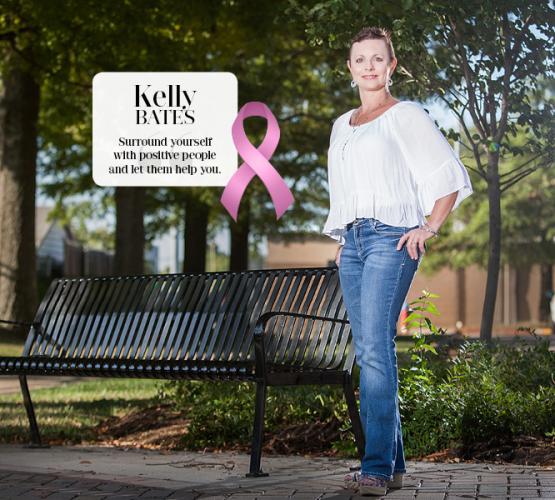
Receiving the diagnosis came quickly for Kelly Bates. “I felt a lump, had a diagnostic mammogram, ultrasound and biopsy. Two days later, I was diagnosed with breast cancer.”
Her initial reaction included fear, panic and feeling overwhelmed by information and the need for quick decisions. “When I first told my children, my son looked at me, his little face filled with fear and panic, and asked me if I was going to die. That moment I knew I needed to do everything I could to make sure I survived.” Tremendous support came from her husband, family, friends and Commerce Lexington family. She also relied on her “tribe of girlfriends” more than ever.
“I did not research a lot on the internet. I found good doctors and trusted them.” She says that her team of doctors, Eldridge, Oncologist, A.J., General Surgeon and Monica Hall, Plastic Surgeon, and their staffs were “amazing and compassionate.”
Advice Kelly would give others is this, “You are braver than you think, stronger than you believe and remember, even during the most difficult times that this too, shall pass. Surround yourself with positive people and let them help you.
Although you may feel powerless you are not, you have control over your attitude.”
Going through a cancer diagnosis is life changing. “I am more thankful on a daily basis, I try not to stress about small stuff, and I focus more on finding the good in each day. I’m grateful for every day that I still get to be a mother to my children.”
Kelly would like to say how grateful she is to each and every person who loved, supported and prayed for her and her family. “Value and nurture the relationships in your life because when life throws you a curve ball, those relationships are what will matter most.”